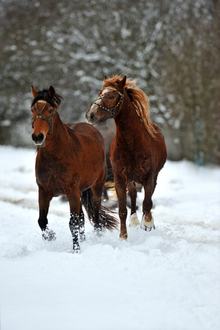With the arrival of cold weather and the holiday season, horse owners can show their horses that they care by giving their equines a little extra care, some special healthy treats, and an opportunity to exercise their legs and take in plenty of good fresh air.

Benefits of a warm horse bit
Riding during the winter is important but using a cold, frozen bit can cause mouth damage and a cold equine bit not only causes pain but can create numbness, physical discomfort, injury and a head-shy horse.
According to Jamie Sturgess, inventor and president of Bit Blanket, Inc., "just because it's cold, that doesn't mean it is time to hibernate. Unlike bears, horses are happy to get out, stretch their legs and hit the trail year-round."
"Winter riding is important as it provides great exercise for your horse's legs and cardiovascular system. In fact, the health benefits of staying active during the winter months are equally as good for the rider. But before you ride off into the sunset, there are some important tips to keep in mind; staying safe and being prepared are at the top of the list. The winter months do provide a challenge for horses and their riders.
The risk of hypothermia is an issue for you. Be sure to layer your clothing, making sure the outer layers are made of wind and waterproof material to keep you dry and to help keep the wind out. Cover up any bare skin, especially the ears-so wear a hat under that helmet. Slick or snow-covered ground and hidden hazards such as holes, poles, logs and bogs could easily cause problems for your horse so be very selective on where you ride during the winter.
Don't stray too far from the barn in case conditions do cause a problem, and avoid icy ground or hard frozen surfaces. It's also important to avoid working him so hard that he gets sweaty. Feel free to do plenty of walking, some trotting and limited cantering. By providing ideal conditions that are in your control, you can create a positive winter experience for both of you. In order to get your horse moving in the right direction, you'll need the ability to steer your steed.
That process starts with a bit. Unfortunately, bits get mighty cold in the winter and most experts agree it's best to warm a cold bit before putting it in your horse's mouth. Not only can a cold, frozen bit cause pain and mouth damage, a warmer bit makes it easier and more comfortable for a horse to accept.
There are a number of ways to accomplish this; warm water, heat packs, a blast of hot air from a hair dryer and the good, old-fashioned way of sticking it under your armpit. A simple and effective way of bringing a bit to a more humane temperature-without sacrificing yourself-is the Bit Blanket, an electric warmer designed specifically for horse bits.
Routine horse health care
Routine health care must be maintained through the winter. One common misconception during cold temperatures is that de-worming is not required. Winter is actually an excellent time to de-worm. The conditions may prevent the hatching of some eggs but there are still some internal parasite eggs that can survive cold temperatures. For this reason horses need to be de-wormed throughout the winter. By de -worming now, your horse will remain worm-free longer. It’s also important to maintain a regular vaccination and health care schedule with your Veterinarian.
No hoof, no horse
Hoof care is often overlooked during the winter as many horses are ridden less frequently. Horse’s hooves should be inspected daily for foreign objects and picked clean, especially during rainy periods when mud and manure can become packed in the hoof. It’s a common practice to remove shoes from horses during the winter, however regular farrier care is still required every six to eight weeks to keep your horse’s hooves in good condition.
Some horses may require shoeing year round due to lameness or conformation issues, even if they are not ridden during this period. It is also recommended to put your horses on a hoof supplement during the winter. The harsh conditions of winter can create cracks in the hooves so a good hoof supplement that consists of biotin, amino acids, zinc and copper will help keep the integrity of your horse’s hooves throughout winter.
Horse dental care often ignored
Cold temperatures can lead to mouth related problems for horses, especially older horses. Additional grain supplementation may be needed during the winter however horses will not be able to efficiently use the extra feed without sound teeth. Horses with poor teeth may be able to maintain good body condition in the summer but this becomes much more challenging in the winter. Horses should be examined every few days in the winter to be sure that they are maintaining adequate body condition.
Another issue during the winter is related to your tack and bit accessories. Riding during the winter is important but using a cold, frozen bit can cause mouth damage. A cold equine bit not only causes pain but it can create numbness, physical discomfort, lip and tongue injury and a head-shy horse. Consider using a bit warmer as it will bring the bit to a safe and comfortable temperature for your horse.
Press release news article from: Helping Horse Owners Take the Bite out of Winter by Jamie Sturgess, Inventor and President of Bit Blanket, Inc - Note: This is a reposting of an article first posted on EquiMed Dec. 2012
